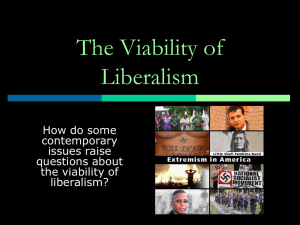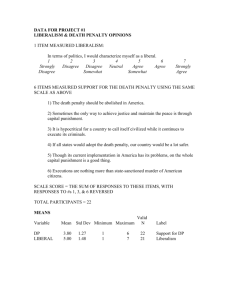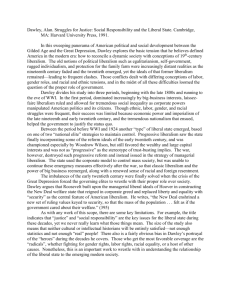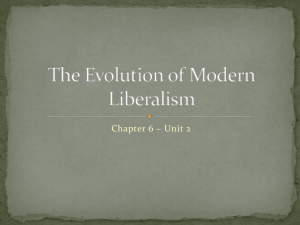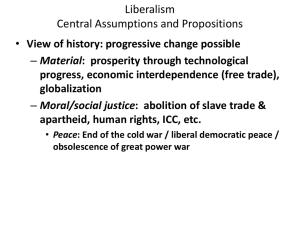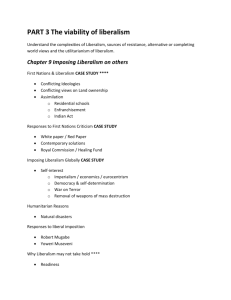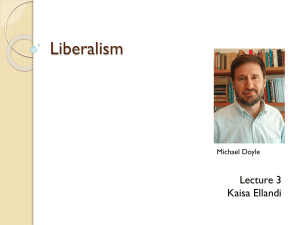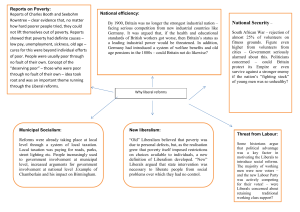Competing Liberalisms as Conceptual
advertisement
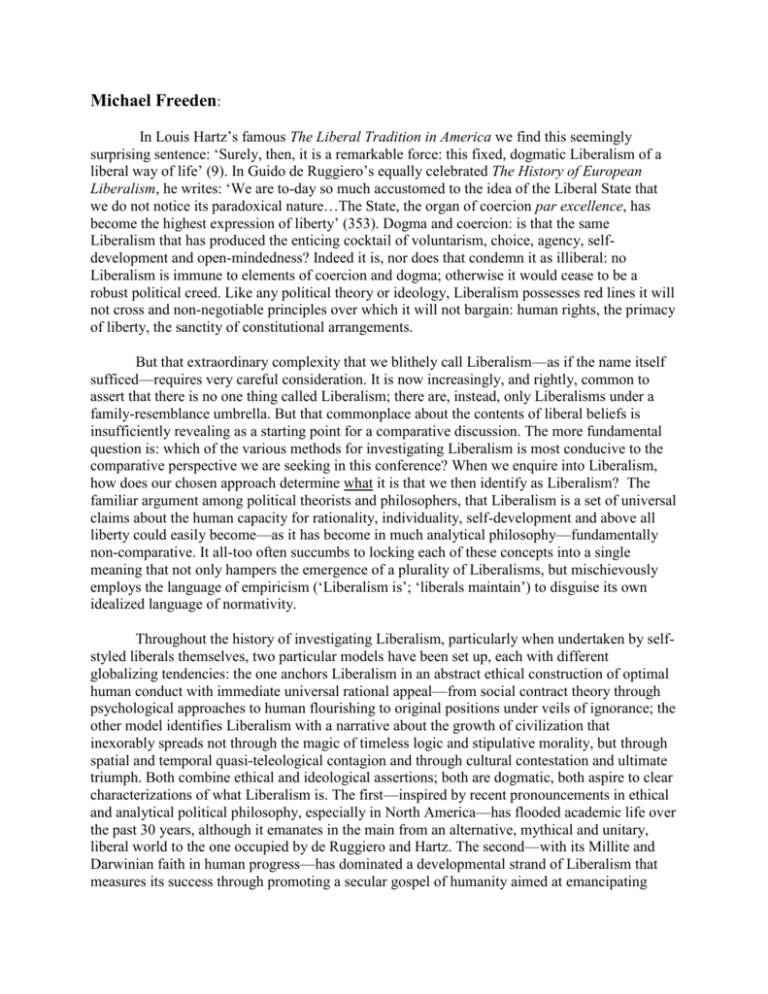
Michael Freeden: In Louis Hartz’s famous The Liberal Tradition in America we find this seemingly surprising sentence: ‘Surely, then, it is a remarkable force: this fixed, dogmatic Liberalism of a liberal way of life’ (9). In Guido de Ruggiero’s equally celebrated The History of European Liberalism, he writes: ‘We are to-day so much accustomed to the idea of the Liberal State that we do not notice its paradoxical nature…The State, the organ of coercion par excellence, has become the highest expression of liberty’ (353). Dogma and coercion: is that the same Liberalism that has produced the enticing cocktail of voluntarism, choice, agency, selfdevelopment and open-mindedness? Indeed it is, nor does that condemn it as illiberal: no Liberalism is immune to elements of coercion and dogma; otherwise it would cease to be a robust political creed. Like any political theory or ideology, Liberalism possesses red lines it will not cross and non-negotiable principles over which it will not bargain: human rights, the primacy of liberty, the sanctity of constitutional arrangements. But that extraordinary complexity that we blithely call Liberalism—as if the name itself sufficed—requires very careful consideration. It is now increasingly, and rightly, common to assert that there is no one thing called Liberalism; there are, instead, only Liberalisms under a family-resemblance umbrella. But that commonplace about the contents of liberal beliefs is insufficiently revealing as a starting point for a comparative discussion. The more fundamental question is: which of the various methods for investigating Liberalism is most conducive to the comparative perspective we are seeking in this conference? When we enquire into Liberalism, how does our chosen approach determine what it is that we then identify as Liberalism? The familiar argument among political theorists and philosophers, that Liberalism is a set of universal claims about the human capacity for rationality, individuality, self-development and above all liberty could easily become—as it has become in much analytical philosophy—fundamentally non-comparative. It all-too often succumbs to locking each of these concepts into a single meaning that not only hampers the emergence of a plurality of Liberalisms, but mischievously employs the language of empiricism (‘Liberalism is’; ‘liberals maintain’) to disguise its own idealized language of normativity. Throughout the history of investigating Liberalism, particularly when undertaken by selfstyled liberals themselves, two particular models have been set up, each with different globalizing tendencies: the one anchors Liberalism in an abstract ethical construction of optimal human conduct with immediate universal rational appeal—from social contract theory through psychological approaches to human flourishing to original positions under veils of ignorance; the other model identifies Liberalism with a narrative about the growth of civilization that inexorably spreads not through the magic of timeless logic and stipulative morality, but through spatial and temporal quasi-teleological contagion and through cultural contestation and ultimate triumph. Both combine ethical and ideological assertions; both are dogmatic, both aspire to clear characterizations of what Liberalism is. The first—inspired by recent pronouncements in ethical and analytical political philosophy, especially in North America—has flooded academic life over the past 30 years, although it emanates in the main from an alternative, mythical and unitary, liberal world to the one occupied by de Ruggiero and Hartz. The second—with its Millite and Darwinian faith in human progress—has dominated a developmental strand of Liberalism that measures its success through promoting a secular gospel of humanity aimed at emancipating individuals and peoples who are at earlier stages of advancement. It rejects the illusion of state neutrality and regards the state as the remover of hindrances, the underpinner of harmony, the elicitor of individual potential and the facilitator of personal visions. But conceiving of Liberalism either as a philosophical-ethical moment or as an unstoppable historical force are not the most helpful ways of engaging in proper comparison; not the least because neither stops to ask what the discourses and practices we tend to call liberal actually are and of what are they constituted, a question that we need to ask long before we mount the ethical or ideological barricades, equipped with a grand sense of mission concerning what Liberalism should be. Here another method might reveal rather different constructs masquerading as, or contending for, the title ‘liberal’. When we apply a ‘micro’ approach to liberal thinking, we will find that it is indeed organized around core concepts, core not in the sense of being essentialist but of being centrally in evidence—historically and discursively—in all major expressions of liberal thinking. Four of those have been chosen for today’s sessions: individualism, tolerance, markets and universalism. They are, of course, not the only liberal core concepts we could have discussed: liberty, progress, constrained and accountable power, and sociability-cum-mutuality, are other prime candidates. The point is that Liberalism inevitably emerges as a mass of contradictions and partial incompatibilities. That is not something we should necessarily bemoan or seek to overcome: the structural flexibility of Liberalism’s conceptual architecture mirrors its pursuit of tolerance, but its inescapable ‘dogmatism’ limits that flexibility to revolving around constraining conceptual nodes. The reason for that is clear: each of those core concepts rotates through a range of meanings and not all of those meanings, nor all of the conceptual configurations they create together, remain within the confines of what we would normally consider to be Liberalism. But some version of each core concept is necessary for a reasonably full liberal profile to obtain, rather than just stray liberal fragments, and some conceptual combinations may not be cacophonic but euphonic. The crucial issues in the analysis of Liberalism are therefore dual: First, what are the semantic boundaries of its core concepts that liberals can put up with, before their creed mutates into something else? Second, it is not just the presence or absence of a core concept that determines the profile of Liberalism. The question is rather: what is the relative weight of each core concept within the liberal conceptual cluster—that is, the distribution of significance that each concept can attract. When a single core liberal concept expands to take up all available space, the delicate and complex internal balance of Liberalism is demolished—then we inevitably have ilLiberalism if one core concept dominates all the rest. For example, if we run with markets alone—with the privatization of exchange relationships or the establishing of a vested sphere of civil society—at the expense of individual development or liberty as reflective choice, the claim for membership of the liberal family begins to falter. Tolerance, as Rousseau understood so well, is itself a dogma (of his civil religion) that unequivocally required the suppression of intolerance. ‘We must be absolutely intolerant about intolerance’ says Rousseau, no liberal himself but that is a very liberal statement. Thus liberal tolerance would stop at the gates of embracing abuses of human rights. Liberal universalism—we may find out later today— does not coexist happily with some forms of liberal diversity and pluralism. Individualism, taken to an extreme, produces a social atomism that undermines liberal humanism and sociability. In sum, just as a single swallow does not make a summer, the sighting of a single feature of Liberalism does not make it Liberalism, and the maximization of any one liberal value threatens the optimization of the rest, or even subverts their more normal survival at sub-optimal levels. It is only through the continuous flexible interplay between core liberal concepts that we can appreciate the intricacy of liberal argument as well as its limits. These concepts are never completely determinate, though both ethicists and ideologists would dearly like to decontest their contested meanings as far as they can. Here liberal coercion resurfaces. In Rawls’s own telling words, ‘If we feel coerced, it may be because, when we reflect on the matter at hand, values, principles, and standards are so formulated and arranged that they are freely recognized as ones we do, or should, accept’ (Political Liberalism, p. 45). That is not an ethics of free choice; it is one of rational choice that invalidates other choices as bad or erroneous—another version of the famed dictates of reason. Liberal ideologists, too, have insisted that the state undertake compulsory activities without which individual rights cannot be safeguarded, nor individual welfare enabled. Appeals to reason or to fellow-feeling as well as strong and passionate uses of rhetoric are always the application of persuasive force, always a competition over the control of political language—and Liberalism is no stranger to any of those. But what the formulators of liberal thought do is not the same as what we—the interpreters of liberal thought—are required to do professionally, namely, to show how the variants of that rich liberal language emerge. Furthermore, it is only through our sensitivity to the multiple—and occasionally messy—meanings carried by core liberal ideas that we can employ that insight beneficially in the service of comparison. Competing dogmas and even forms of ideational coercion come naturally to all types of political thinking—that is one reason that makes such thinking political—and it is quite normal for Liberalism too to display those features in a mild form. However, to adopt an uncompromising ethical or ideological mode in rooting for one kind of Liberalism, or one approach to it, whatever that may be, would be to destroy the rationale of comparison as well as to emaciate Liberalism itself. Comparison is not a tagged-on extra to the study of political thought; it derives directly from the appreciation that the values signified by political words will always remain polysemic, and from the understanding that neither time, nor space, nor conceptual architecture can hold the meaning of Liberalism constant. The legitimate rearrangements of liberal permutations have little to do with any intrinsic logic of liberal argument. Rather, they have almost everything to do with the social and cultural adjustments that need to be performed, time and time again, when liberals try to claim their place in the sun in very different climes.

